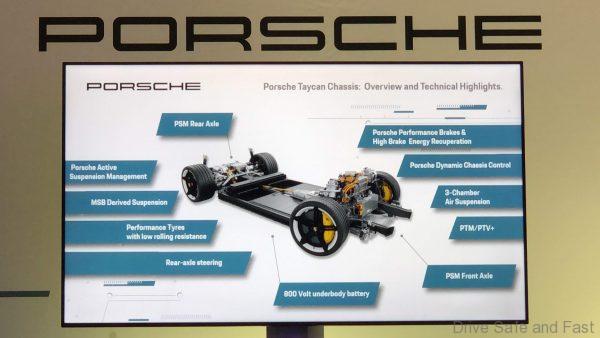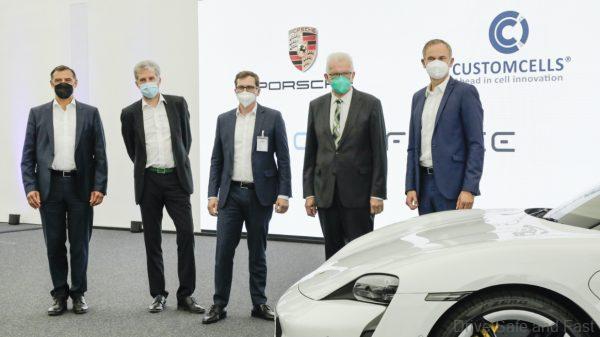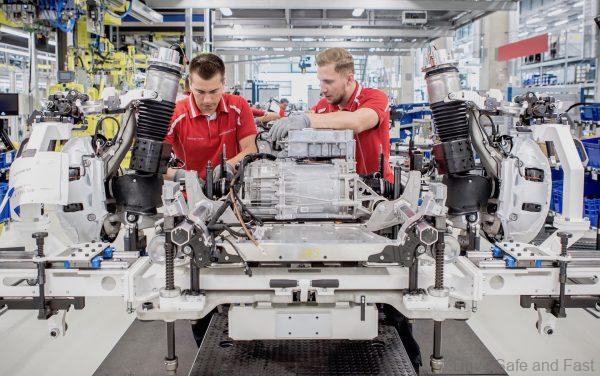When it comes to electric mobility, the battery is one of the most important components in the equation. Cell chemistry is an ever-evolving technology, and potential bottlenecks in the supply line can threaten to pause car production. Instead of relying on one of the external battery cell producers, Porsche is now opening up their own. The Cellforce Group was announced this week, a joint venture between Porsche and Customcells.

Porsche is a majority stakeholder in this joint venture, taking the lion’s share of 83.75% ownership, with 60 million euros of state funding coming in too. Cellforce Group will be headquartered in Tübingen, with a production centre being planned nearby.

This proximity to Porsche’s existing Weissach Development Centre (where the upcoming electric Macan is being tested) will help the company speed up testing, development and production of new types of battery cells. The battery cell plant will have a minimum production capacity of 100 MWh per year, which is enough for Porsche to make 1,000 electric cars a year. Perhaps these are cells that will be reserved for the most extreme performance electric cars from the brand.

The Cellforce Group starts with just 13 employees but is expected to employ about 80 by 2025.
About High-Performance Battery Cells
The chemistry of the new high-performance cells relies on silicon as the anode material. With this material, it now seems possible to significantly boost the power density compared to current good series batteries. The battery can offer the same energy content with a smaller size. The new chemistry reduces the battery’s internal resistance. This allows it to absorb more energy during energy recuperation and at the same time it offers improved performance for fast charging. Another special feature of the Cellforce battery cell is the fact that it is better able to withstand high temperatures. These are all qualities which are highly valued in motorsport. In addition, use on the race track does not necessarily require the battery to function in sub-zero temperatures nor remain stable for years over many charging cycles – goals which have yet to be achieved with this new cell technology.

The world-leading chemical company BASF has been chosen as a cell development partner for the next generation of lithium-ion batteries. As a part of the collaboration, BASF is exclusively providing high-energy HEDTM NCM cathode materials for high-performance cells that enable fast charging and high energy densities. At BASF’s manufacturing facilities for primary products of cathode materials in Harjavalta, Finland, and for cathode materials in Schwarzheide, Brandenburg, Germany, BASF will be able to produce battery materials with an industry-leading low carbon footprint from 2022.
The road to the joint venture and the partners
The idea for a manufacturing plant for high-performance battery cells came from an initiative of the P3 Group. The Stuttgart-based management consultancy developed the concept and submitted in 2019 a funding application with Customcells as part of the European IPCEI project EuBatIn (Important Project of Common European Interest – European Battery Innovation), which aims to build up a competitive European value chain for lithium ion batteries, based on innovative and sustainable technologies. From the automotive industry Porsche got involved as a project partner. This year P3 Group decided to maintain neutrality and independence in the market and not to be directly involved in the joint venture. P3 acts as a technology consultancy with a deep technical understanding in the field of battery cells and has concluded a long-term service contract with the Cellforce Group.
The contracts between Porsche and Customcells were signed on May 21, 2021. The Managing Directors of the new Cellforce Group GmbH are Markus Gräf as Chief Operating Officer and Wolfgang Hüsken as Chief Financial Officer from Porsche, and Torge Thönnessen as Chief Technology Officer from Customcells.
Customcells is one of the world’s leading companies in the development of special lithium-ion battery cells. At the company’s locations in Itzehoe (Schleswig-Holstein) and in Tübingen (Baden-Württemberg), Customcells develops and produces application-specific battery cells ranging from prototypes to small and medium series – Made in Germany. Since it was founded in 2012, Customcells has acquired important know-how in the field of cell development with diverse materials (cathodes, anodes, separators, electrolytes) and coating technologies. Customcells manufactures small series of special lithium-ion battery cells, for example for the aviation and shipping industries, based on agile manufacturing concepts and state-of-the-art re-search and production facilities.
Dr. Ing. h.c. F. Porsche AG is the world’s most successful spots car manufacturer. The company was founded in Stuttgart in 1948 by Ferry Porsche and has been a part of the Volkswagen Group since 2012. Porsche has around 36,000 employees. In the 2020 financial year Porsche AG set a new revenue record: the value grew to 28.7 billion euros, surpassing the previous year’s figure by more than 100 million euros. It delivered more than 270,000 sports cars to customers and generated an operating profit of 4.2 billion euros. By 2030, Porsche is aiming to achieve overall carbon neutrality throughout the entire production process and life cycle of its new vehicles.



